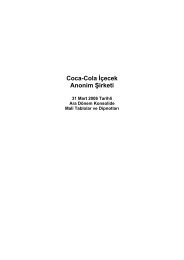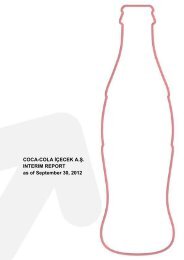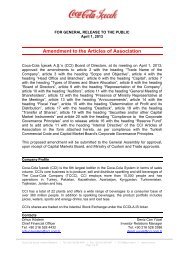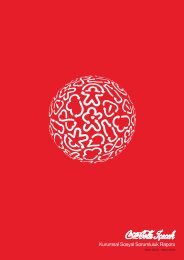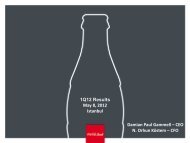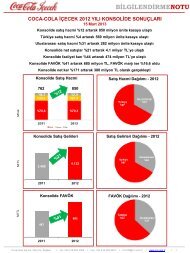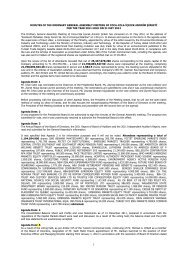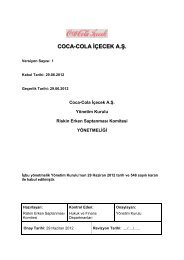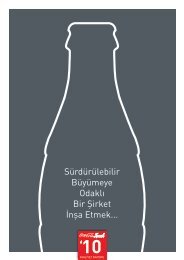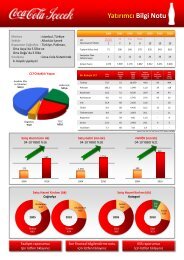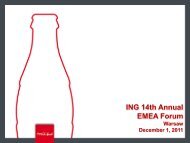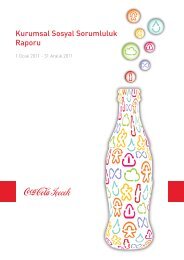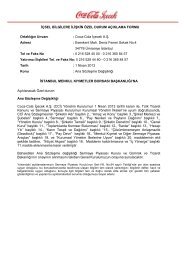OFFERING MEMORANDUM CONFIDENTIAL - Coca Cola İçecek
OFFERING MEMORANDUM CONFIDENTIAL - Coca Cola İçecek
OFFERING MEMORANDUM CONFIDENTIAL - Coca Cola İçecek
- No tags were found...
You also want an ePaper? Increase the reach of your titles
YUMPU automatically turns print PDFs into web optimized ePapers that Google loves.
e increased in the future. For example, the Government increased a similar special consumption tax rate on alcoholic beveragestwice since the end of 2003. If the Turkish government increases the amount of the special consumption tax or changes the wayin which the tax is applied, our financial results could be adversely affected.The Turkish Competition Authority or similar regulators in our other markets could restrict our ability to engage in certainbusiness practices.Competition in Turkey is principally regulated by the Law on the Protection of Competition, No. 4054 of 1994 (the"Turkish Competition Law"). The Turkish Competition Law is enforced by the Turkish Competition Board, which has thepower to investigate possible violations and impose fines. In February 2004, following an investigation which began in 2002,CCSD was found to be dominant in a "carbonated soft drink market" based on market circumstances at that time. CCSD was,however, found not to have abused its position of dominance, and no fine was imposed. Under the Turkish Competition Law,CCSD could be subject to fines if it were found both to be dominant and to have engaged in business practices that wouldconstitute an abuse of dominance. These practices include, without limitation, entering into exclusivity arrangements withcustomers in exchange for payments such as bonuses or premiums, charging resale prices for products of The <strong>Coca</strong>-<strong>Cola</strong>Company that are below an acceptable measure of cost with the intention to eliminate current or potential competitors or that areabove an acceptable measure of margin, cross-subsidizing its products (i.e., using profits made in one market segment wherecompetition is weak to support lower prices in another market segment where competition is more aggressive), refusing tosupply products without justification, or restricting production, marketing or technological development to the detriment ofconsumers.In addition, the Turkish Competition Board is currently examining whether to keep in place the block exemptioncurrently granted to carbonated soft drink companies in Turkey enabling them to enter into exclusive agreements with salesoutlets. See "Business—Regulation—Competition Regulation."We cannot predict whether competition law enforcement by the Turkish Competition Board or by similar regulatoryauthorities in our other markets in the future will result in significant fines being imposed on us, require us to change our currentbusiness practices or result in adverse publicity. Any of these outcomes could have a negative impact on our competitivenessand results of operations.Fluctuations in exchange rates may adversely affect the results of our operations and financial condition.Our purchases of PET resin, cans, sugar and HFCS are typically denominated in or indexed to U.S. dollars. In 2003,2004 and 2005, 36.6%, 33.2% and 37.4%, respectively, of our purchases of raw and packaging materials (excluding concentrate)in Turkey were denominated in Turkish Lira, and 63.4%, 66.8% and 62.6%, respectively, were denominated in foreigncurrencies (almost all of which was in U.S. dollars). With respect to our international operations, in 2003, 2004 and 2005,49.0%, 45.0% and 43.0%, respectively, of the purchases of raw and packaging materials (excluding concentrate), respectively,were denominated in local currencies and 51.0%, 55.0% and 57.0%, respectively, were denominated in foreign currencies(almost of all which was in U.S. dollars).We incur currency risks whenever we enter into a transaction using a currency other than local currencies. We attemptto reduce our currency risk by, wherever practicable, purchasing raw and packaging materials in transactions denominated inlocal currencies. In addition, because concentrate prices for most of our CSDs in Turkey have been determined by reference to apercentage of our U.S. dollar net sales as calculated in accordance with U.S. GAAP, a large proportion of our concentrate priceshas been effectively hedged against possible devaluations of the New Turkish Lira. Given the volatility of the currencies in thecountries in which we operate, we cannot offer any assurance that we will be able to manage our currency risks effectively orthat future volatility in exchange rates will not adversely affect our financial results.In addition to managing these transaction risks, we translate non-New Turkish Lira denominated results of operations,assets and liabilities into New Turkish Lira to prepare our IFRS consolidated financial statements. The revaluation of balancesheet items results in foreign exchange translation losses or gains, which are reported as non-operating expenses or income,which can have a material effect on our results.See "Management's Discussion and Analysis of Financial Condition and Results of Operations—Principal FactorsAffecting Our Results of Operations—Exchange Rates."Risks Relating to Control by Principal Shareholders



